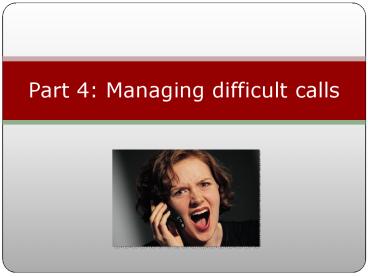Part 4. Managing Difficult Phone Calls - PowerPoint PPT Presentation
Title:
Part 4. Managing Difficult Phone Calls
Description:
Basic Triage Skills for Sexual Health Clinic Frontline Workers – PowerPoint PPT presentation
Number of Views:670
Title: Part 4. Managing Difficult Phone Calls
1
Part 4 Managing difficult calls
2
Non priority groups wanting an appointment
- If the caller is adamant that they want to
attend the service and they are not triaged as an
STI priority
Be firm -- not defensive or overly apologetic --
and polite. Be aware of the tone of your voice,
it is probably easier to convey empathy in your
voice, if you think about what the caller wants
and the feelings they are experiencing. Remember
the role of triage includes finding the right
service for the caller.
3
Non priority groups wanting an appointment
- If the caller is adamant that they want to
attend the service and they are not triaged as an
STI priority
Inform the caller you are happy to assist in
finding an appropriate service for them It may
be difficult for some people to communicate over
the phone and it may be appropriate to offer to
refer them to a nurse or manager.
4
Im not sure I can assist you further, would you
like to talk to a nurse or manager?
Im sorry I cant give you an appointment. We are
a specialised service an what you are requesting
can be done by a GP
Im happy to help you find an appropriate service
you can attend
5
Client wants free services
- Sometimes non-priority clients want to come into
a sexual health clinic because it is free and
some other services that provide testing may come
at a cost which the caller is reluctant or unable
to pay. - Essentially, there is not enough funding or
resources for sexual health services to provide
testing to the whole NSW population. Free
services are provided only to those most in need.
6
It sounds like the cost of testing may be an
issue for you. If you wish, I can suggest a
service that may be able to provide you with some
other options.
Its called the NSW Sexual Health Info-line and
you will be able to speak to a Sexual Health
Nurse.
7
Emotional calls
- Sometimes you may receive a call from someone who
is tearful, anxious or angry. - This can make communication and triage difficult.
- In these circumstances support the client by
acknowledging their emotional state.
8
I can hear youre anxious/angry/upset and we need
to talk about what your needs are, so I can give
you appropriate help.
Can you do this now or would you like to call me
back later when its easier for you to talk?
9
Verbal aggression and threats
- NSW Health has a zero tolerance for any
aggression in the workplace and it is not your
role to be a recipient of such an offense. - If a caller because verbally aggressive, inform
them of your limits.
10
Verbal aggression and threats
- If the inappropriate behaviour continues, inform
the caller you will end the call and then do so
11
If you continue to be verbally aggressive, I
cannot assist you. I will end the call if you
cannot control your behaviour.
12
Reflective Exercise
Think about the last time you dealt with a
difficult call.
- What listening skills did you demonstrate?
- What did the caller want?
- How did that make you think and feel?
- Did you remain calm?
- Was your manner positive and professional?
- Were you able to say no without feeling anger,
guilt or fear? - Did you avoid responding forcefully and arguing
back?
13
What did you say to convey empathy and
understanding? Were you happy with the
information you provided to the caller?
Did you remain patient and in control of your
emotions? Did you feel angry and if so, were you
able to relax enough to respond calmly to the
caller?































